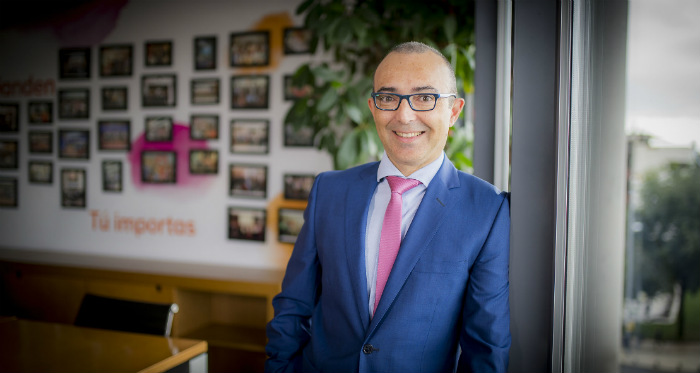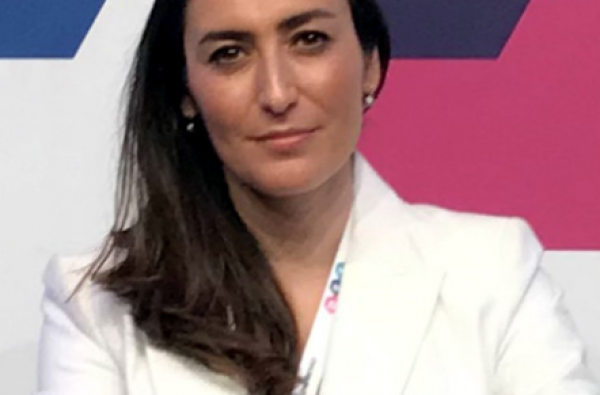Although for the CIO of Nationale-Nederlanden, Jordi Bueno, automation is a great business advantage, he says that people remain strategic for business, and relies on technologies such as the cloud and automatic learning to bring more value to customers.
New technologies, such as artificial intelligence (AI) and the cloud, are changing business so much that the CIO of Nationale-Nederlanden, Jordi Bueno, acknowledges that he does not know "how the insurance of the future is going to be". His company, which specialises in short-, medium- and long-term savings and investment solutions, protection and pensions, is in the midst of a digital transformation. Although he says it's a continuous process, in the five years it's been in business, the company has already had some successes. He points out that the digitisation of certain processes has led to an increase in efficiency which translates into "savings of 1.8 million euros per year".
However, for Bueno, his digital transformation is not only focused on benefiting the company but also the customers. That's why its focus is on leveraging data and machine learning to deliver better communication and care systems, and more personalized products.
One of the 10 Emerging Technologies that MIT Technology Review has selected in 2018 is massive genetic studies, capable of finding common traits in people's DNA to predict possible diseases. How do you evaluate this new technology?
Data management and cloud services are being an important lever in our digital transformation. Before, we wanted to analyze all the data we handled, but technology was a limitation. Now it's not.
For example, in 2000 we created a data warehouse, but it no longer gives us all the information we need to better serve customers. Now we are betting on having all the systems in the cloud.
At first, we focus on customer information. Now, we are starting to work with other data, such as claims and finance. Between this year and next year we want to have everything in the cloud. We also want to take advantage of the capabilities provided by automatic learning analysis platforms.
The ease of analyzing data that is hosted in the cloud will give us, for example, a great ability to study fraud and claims issues, and will help us set the price of products. It's a moving moment inside the house, but the lines to follow are clear.
What impact do you think this data processing and storage can have on your business?
The benefit will be immediate as soon as we are able to generate automatisms from the data analysis. For example, it will help us decide which services we should invest more in or detect new claims that we may not be seeing now.
Recently, we identified that we had many professionals who managed data on a day-to-day basis. Now they all work in the data scientists department. They are experts who study the data to arrive at a very precise level of analysis, identify needs and allow us to make possible changes.
How have you integrated the application of new technologies into your company's services?
We are more focused on the "life" segment, such as pensions and customer financial needs in the short, medium and long term. Although in this type of business it is very important to provide face-to-face care, we have also integrated mobility into our services. Our 2,000 street agents carry mobile devices so that no paper is needed anywhere in the process.
We started working like this in 2015 and right now 50% of the policies we issue do not need human intervention. Only a few minutes pass from the moment the client signs the contract until he receives a communication with the contract. We have achieved these efficiencies thanks to technology and digital transformation.
This type of technology has a clear return for the company, but do you think you can also help customers?
Yes, we have focused on omnicanality. Technology allows us to serve customers when and how they want. Some prefer the telephone and others the web page. You can also opt for a mixed service. For example, if someone is hiring a complicated product online, they can turn to a professional advisor to advise them on a figure that is still strategic in our business.
As complex as it is, we try to get the client to approach us wherever they want and, throughout the process, they can decide how they want to continue. If we want to be faster and more efficient, we must encourage self-service among our customers and more use the online channel. Right now about 80% of our customers' transactions are made through the website.

It is said that customer orientation is crucial, does this data analysis also allow them to offer more personalized products?
For many years we have been carrying out what we call the study of the customer's DNA, i.e. the analysis of their needs. We put in a tool all the information of the user: if he has a family, his income, his savings plans for retirement, etc.. These data are studied and, at the end of the process, a recommendation is offered to choose one or another financial solution.
However, it is a process that is alive. The situation of customers changes throughout their lives. Having these data updated allows us to know the solution that a person is going to need in the future. Last year we launched our innovation laboratory in Spain, SparkLab, with that goal in mind. We are opening an important line of research and studying what type of financial product is going to be required in five or ten years' time.
We are also working to offer more flexible and modular policies so that customers can add or remove services depending on their situation. However, here technology is a handicap for us because we need platforms that allow us to do this in a more agile way. We suffer like all banks and insurance companies that have been in the market for many years.
These new technologies are favouring the entry of companies into sectors to which they traditionally did not belong. How are you preparing for the entry of new competitors?
Right now everything is being mixed up. For example, telecommunications companies want to be banks and banks want to be insurance companies. The key will be to encourage interconnection between organizations and have robust APIs to facilitate that connection. We are going towards an interconnected world and alliances between companies, rather than competitors. For example, recently a collaboration has been announced between Telefónica and Amazon. What are they going to compete for? Whoever knows how to play best with this type of combination will have access to a good part of the business.
How is the insurance world going to act in the face of this? Is it going to be a relevant sector among the new fields or is it going to be absorbed by other sectors?
The insurance world is very complex and highly regulated. It takes a lot of knowledge to set up an insurance company. I see the future more in terms of collaboration.
There is going to be a lot of discussion about the insurance of the future. For example, it is already happening with autonomous cars. What are you insuring? Is the software or the vehicle insured? Will the manufacturer be the insurer? (see Insurers will control the risks of autonomous vehicles)
As a CIO, what capacities do you consider necessary to address all these changes?
Knowledge is needed in new technologies, which are scarce today. But also, as a CIO and as an organization, it is essential to have a capacity for brutal change. Five years ago we started the digital transformation, which is a continuous project. You were this and now you are going to be something else. The new way of working has a lot to do with delegating, contributing, building and self-evaluating. These novelties have a great impact on people. The changes depend on how flexible the company is, how much it wants to take risks and how fast it transforms. The key is to strike a balance and keep changing.
Precisely, according to the OSCE, over the next five years more than four million digital employees are expected to be missing from the labour market. How is your company preparing for this?
It's not an easy solution. Digital profiles demand new ways of working: for goals, with freedom, in a healthy and attractive work environment where they can develop their skills. They also need technological challenges, something that, fortunately, we can offer them. We are in that moment to open our minds and take advantage of talent wherever it is.
By Alba Casilda



